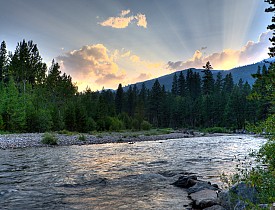The Five Best and Five Worst Cities for Water Quality
 I have been known to scoff at products that list their first ingredient as water – until, of course, I remember that water is my first ingredient. When you take that simple fact into consideration, water quality becomes one of life’s most important issues. While there are numerous water filtration systems on the market, it is good to know the quality of the water actually coming out of your tap. Where you live tends to make a difference.
I have been known to scoff at products that list their first ingredient as water – until, of course, I remember that water is my first ingredient. When you take that simple fact into consideration, water quality becomes one of life’s most important issues. While there are numerous water filtration systems on the market, it is good to know the quality of the water actually coming out of your tap. Where you live tends to make a difference.
Studies of water quality follow various criteria; the best examples come from non-political or non-promotional sources. To research the water quality in your locale, request an Annual Water Quality Report, also known as the Drinking Water Quality Report. These consumer confidence reports must be provided in areas with public water systems that have at least 15 service connections or serve at least 25 year-round residents.
The following best and worst categories were culled from US studies performed between 2008 and 2010. Because study criteria vary, so do the results. The cities here appear on several lists and are only intended to give you a general idea.
The Five Best Cities for Water Quality:
1 – Portland, Oregon
2 – San Jose, California
3 – San Francisco, California
4 – Boston, Massachusetts
5 – Louisville, Kentucky
The Five Worst Cities for Water Quality:
1 – Las Vegas, Nevada
2 – Reno, Nevada
3 – Pensacola, Florida
4 – Casper, Wyoming
5 – Concord, New Hampshire
What are the criteria for good water quality?
Again, the answer depends on who you ask or where you do your research. However, all agree that high quality tap water contains the lowest possible levels of contaminants, including bacteria or made-made chemicals and compounds such as pesticides and residual pharmaceuticals. Though water contaminants in tap water do not affect most consumers immediately, they have been shown to cause severe illness, such as cancer and liver damage, over long periods of time. IMPORTANT TO KNOW: Even chemicals traditionally used in water supplies, like chlorine and fluoride, can have dangerous effects on health.
An investigation by the Associated Press turned up significant quantities of pharmaceuticals in 24 major cities' tap water. The drugs found included anti-convulsants, antibiotics, sex hormones, and mood stabilizers. SAFETY NOTE: Please do not throw unused medications down the toilet or drain! Contact your local public works department regarding proper disposal.
Other criteria for determining good water quality include:
- air quality
- distance to primary untreated fresh drinking water
- dependence on snow pack and water tables
- history of drought or saltwater intrusion
- population growth trends.
The US Environmental Protection Agency maintains data regarding the water quality of the nation’s watersheds. The EPA bases water quality criteria on how effectively the watershed supports its designated use. For example, Aspen and Vail, Colorado, come in at the top because their watershed supports its designated use by 99 percent.
No study can cover every city or town; they tend to be based on the most populated areas. Look into getting your local report.
To improve your home's water quality, find a licensed plumber in your area to install a good water filtration system.
Updated March 20, 2018.
Looking for a Pro? Call us (866) 441-6648

Plumbing Average Costs
Plumbers Experiences

Tile Installation For New Kitchen Backsplash And Guest Bathroom Floor

Make Your Remodel Work With Great Ideas And Pro Construction



